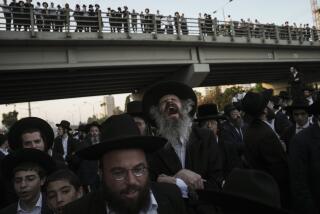Playground fence symbolizes Jewish split in Israel
- Share via
Reporting from Jerusalem -- — A new front in the struggle between Jerusalem’s secular and ultra-Orthodox communities has opened in a tiny nursery school playground, where city officials have drawn what might be called a line in the sandbox.
In response to complaints from ultra-Orthodox parents, officials last week erected a fence dividing the playground in two, separating pupils at a secular school from those at an adjacent Orthodox one.
The fence was torn down Tuesday nigth, probably by secular parents unhappy about the division, leaving city officials to ponder their next move.
Since September, the two schools, both under municipal auspices, had shared the space, where dozens of toddlers drove toy cars, climbed small monkey bars and played in the sand.
The schools also share the building, which belongs to the city’s education authority. On one side is Gan Pashosh, a nursery school with a liberal mix of secular and modern Orthodox 2-year-olds, which opened last fall. The other half is occupied by 3-year-olds attending a school belonging to the ultra-Orthodox foundation Etz Hadaat, with separate classes, because of religious reasons, for boys and girls.
A few parents from the more conservative school said they didn’t want their children exposed to secular ways, such as boys not wearing kippahs or immodestly dressed mothers and staff members.
Ultra-Orthodox Jews tend to shield their families from TV, the Internet and other symbols of modernity that they consider harmful or incompatible with their ascetic lifestyle.
In the split, the Orthodox school’s children got the sandbox and about two-thirds of the space; the other kids got the yellow slide.
Mika Lavi, a teacher at the secular school, said Monday, before the fence was torn down, that it was unfortunate the children would no longer interact on the playground.
“I don’t believe in fences,” said Lavi, one of the founders of the nursery school, as she balanced a young charge on her hip. “They build suspicion, not faith.”
She said city officials were planning to cover the wire fence with blue plastic sheeting so children would not be able to see one another anymore.
“You’d think they don’t see us on the street or in the grocery store,” Lavi said.
Some secular parents protested outside the nursery school Friday. A banner reading “Dialogue and Agreement — Yes; Fences and Hiding — No” was taped to the fence Monday, facing the religious children’s side but intended for their parents.
Esti Kirmaier, a neighborhood activist whose 2-year-old daughter attends the secular side, complained that the fence was built with no notice or dialogue.
“Two parents from the other nursery told us they wanted their children to receive a pure education and don’t want their children exposed to bad language,” said Kirmaier, objecting to the assumption that all secular children swear.
She also noted that at 2, the children barely speak straight anyway.
City officials said in a statement this week that the fence was installed according to the broad vision of answering the different needs of every community. After the fence was destroyed, they issued a statement vowing to work with both groups of parents to resolve the issue.
The schools are in the Kiryat Yovel neighborhood, which has been undergoing a population shift. Affluent secular families have been leaving and many of their apartments have been taken by ultra-Orthodox families.
As is often the case when groups fight for the character of a neighborhood, child-care facilities are key sources of friction.
“It’s not only the nursery,” Kirmaier said. “It’s part of the overall struggle over how we occupy the same public space everywhere.”
Last year, Israel’s Supreme Court ruled on another school clash, ordering the desegregation of an ultra-Orthodox girls school that was separating students based on their ethnically based religious customs.
Some see the playground as a metaphor for the bigger picture.
“This case encapsulates the entire story of religious-secular relations in Israel,” said Aliza Gershon, director general of Tzav Pius, an organization advocating conciliation and dialogue within Israeli society.
“I am saddened by the segregation. Such separation is unnecessary, certainly at such a young age.”
Sobelman is a news assistant in The Times’ Jerusalem bureau.
More to Read
Sign up for Essential California
The most important California stories and recommendations in your inbox every morning.
You may occasionally receive promotional content from the Los Angeles Times.













